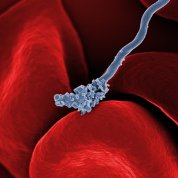

The NIH Record
The NIH Record, founded in 1949, is the biweekly newsletter for employees of the National Institutes of Health.
Published 25 times each year, it comes out on payday Fridays.
Editor: Dana Talesnik
Dana.Talesnik@nih.gov
Assistant Editor: Eric Bock
Eric.Bock@nih.gov
Assistant Editor: Amber Snyder
Amber.Snyder@nih.gov





